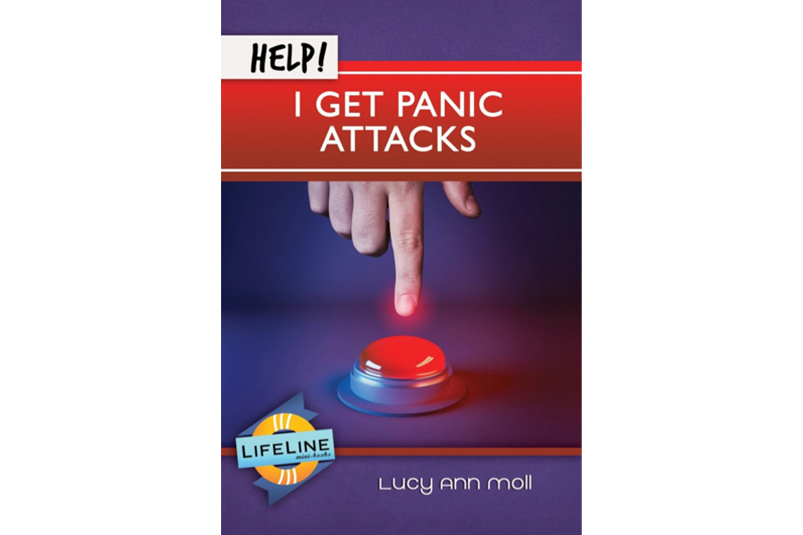
by Lucy | Aug 29, 2020 | emotions
When fear gets the upper hand, and we struggle to know what to do, it may help to have a plan in place. This method helps to calm your anxious feelings that flow from your thoughts. Does it “work” every time you’re afraid? No, of course not. Will is help you understand your emotion and learn how to respond to it wisely? Yes!
MAIN POINT: We can learn to conquer fear as we trust God and apply his truth to our minds.
This article appeared first here at Biblical Counseling Center, where I am on staff providing counseling by video to people all over the world.
Where fear flourishes, there your heart will be also.1
From a mild sense of unease to full-blown panic, fear is an emotion most of us would rather live without. It communicates that someone or something we care about is being threatened or that we might lose it. Fear shows us what we value most.
Consider these three folks who are afraid.
In each case, try to figure out what they each value most.
- Dolores’s elderly mother has dementia and is in the memory care unit of a health facility, which so far has kept its patients and workers safe from COVID-19. Nonetheless, she loses sleep worrying night after night, fearing for her mother’s well-being.
- Breanna has packed her high school schedule with advanced placement and dual-credit classes, hoping to gain admission to a high-ranking university. She fears her friends might make fun of her if she attends a community college.
- John just learned that his company is hiring new workers in his department and is wondering if he’ll be laid off. If he lost his job, how would he make rent and pay utilities?
Fear is very real, and it can keep us from functioning in our daily lives. So how can we calm our fears?
1. Identify your emotion as fear.
Sometimes, identifying an emotion is not as easy as it sounds. You may feel uneasy or nervous or freaked out; you may also feel overwhelmed or hurt. Is fear the most accurate descriptor?
If you’re not sure, ask yourself if you feel like pulling away from people or clinging to them. This reaction is a hallmark of fear: it prods us to seek safety, security, and certainty.
EXAMPLES: A teen who’s afraid of getting judged by friends at church may decide to skip the in-person service and watch the live stream instead; A guy who fears that his girlfriend is going to dump him may respond by showering her with gifts and sending her one text after another.
2. Examine your fear like a scientist.
Once you’ve identified your emotion as fear, examine what is going on by asking yourself a host of questions (you may discover it helps to write down your answers):
Is there a place connected to the fear? Perhaps it is linked to your workplace or to a room in your home, or a place in your town. For the longest time, after I was attacked by a dog at age 8, I could not walk down Bellforte Avenue, near where it happened. Just going near that street caused my heart to pound like a drum.
Is there a certain time that unnerves you? Some of us don’t like a certain holiday or the anniversary of a family member’s death date because it brings uneasy memories of painful events.
Is there a type of activity or a particular person linked to the fear you feel? One of the people I counseled told me she becomes greatly alarmed when she hears sirens. She connects the sound of them to the untimely death of her baby.
3. Evaluate your fear.
Begin by considering your reaction. Ask yourself, is my reaction godly and constructive, or is it sinful and destructive? An example of constructive concern is studying for an algebra exam. You want a good grade so you memorize formulas and rework problems until you are confident you know the material.
In a similar way, David in the Old Testament had a constructive reaction when he faced Goliath (1 Sam. 17). He chose the best weapon for him to defeat the giant (a sling and five smooth stones), and he came in the name of the Lord Almighty, the God of Israel, who had promised victory over the Philistines. His courageous reaction to Goliath sharply contrasted the reaction of the army of Israel, who cowered in fear.
Biblical truth gives us reason to hope and teaches us to turn to God. “No matter what the danger or what we are valuing, God can be trusted with our treasures, and every fear ought to drive us straight toward the Lord in prayer, obedience, and fellowship!” [2]
Next, ask yourself how likely it is that what you fear will actually happen? Let’s say you fear that a routine medical exam might suggest the presence of cancer. Consider the likeliness of a bad result; while possible, it is very low, and worrying about it would be a waste of your energy (Matt. 6:34).
Finally, ask yourself, what is the worst that could happen? When my relatively new refrigerator needed repair for the third time three months in a row, I asked myself this exact question and realized that the worst was the hassle of another repair or getting another fridge, which was under warranty (thankfully). My evaluation gave me a sense of relief, not dread.
4. Act wisely in response to your emotion.
When you identify, examine, and evaluate your fear, you may come to a realization that it was not a big deal after all.
Conversely, you may detect a troubling pattern. For instance, you may notice you have a tendency to worry, to look to people for their approval, to avoid certain situations (e.g., riding an elevator) for fear of a panic attack, and so on.
In any case, it is wise to act in response to fear in godly ways. Here are a few of them:
Train yourself to turn to Scripture. A few excellent passages to read regularly are Phil. 4:4-9, Matt. 6:25-34, Luke 12:22-34, Psalm 23, and Psalm 27.
Practice deep breathing and other healthy habits. Inhaling and exhaling slowly helps us to relax. Other healthy habits are giving yourself ample time to get from place to place, unplugging from the internet, and steering clear of computer screens late in the day, which may interrupt sleep. Additionally, you might incorporate or begin regular exercise (as always, check with your doctor), good nutrition, and a bedtime routine. You’ve already heard healthy tips; decide which one you’ll begin to make a habit.
Face your fears wisely. Are you afraid to ask your boss for a raise? Are you avoiding a family member who unnerves you? Does the idea of flying in an airplane cause your heart to skip a beat? To face your fears wisely, be sure to examine and evaluate them, and have a thought-out plan. Discuss your plan with a trusted Christian friend and loved ones who can support you. You may also consider talking with a biblical counselor.
Hope for a Peace-Filled Life
What you fear need not rule your life. A method to calm your fears helps you to understand that fear reveals your treasure and provides a plan to identify, examine, and evaluate it and to respond to it wisely in accordance with Scripture.
When you handle this negative emotion in the right way, your trust in God increases, and others will begin to ask you the secret that the Apostle Paul had come to know.
“The things you have learned and received and heard and seen in me, practice these things, and the God of peace will be with you” (Phil. 4:9).
[1] This quote comes from the excellent book Untangling Emotions by J. Alasdair Groves and Winston T. Smith (Wheaton, IL: Crossway), 2019, 153. It is a play on Matthew 6:21, which reads, “where your treasure is, there your heart will be also.” The book presents an identify-examine-evaluate-act approach to engaging every emotion. I highly recommend it to those who provide and receive counseling.
[2] Ibid., 160.

by Lucy | Nov 25, 2019 | biblical counseling, emotions, thoughts |
You need to repent of idols of the heart. Idols of the heart are ruling desires of your heart. Begin by identifying the heart with these two questions:
1. Is your desire, “Not my will, but yours be done” (Luke 22:42, NIV)?
2. Or does your cry sound more like demands for security, approval, comfort, and love?
When you want security, approval, comfort, and love, and get want you demand, pride will fill you. Underneath the veneer of pride and self-righteousness are emotions like anxiety, anger, and discouragement and actions like seething, shouting, nail-biting, insomnia, overeating, and self-loathing.
Just as the prodigal son demanded his way, just as the older son self-righteously sneered at his brother when he returned home, chances are you too have ruling desires of the heart that are unholy.
Pray and ask the Holy Spirit to reveal to you negative thoughts, critical speech, gossip, bitterness, immorality, and anything else that exposes a self-ruled heart.
You may want to jot down what the Holy Spirit reveals to you. What are the “rotten fruit” that expose the ruling desires of your heart?
Faithfully yours,
Lucy

by Lucy | Nov 12, 2019 | biblical counseling
Imagine what would happen if we lived victorious faith.
In place of tired and weary hamster-wheel Christianity, people would see Christ in us, in you, right? We’d have a spring in our step, a genuine smile on our fact. Vibrant, authentic, compassionate — these words would describe us.
This description fit one of my counselees too. I met with this 40-something West coast woman by video-conference, where she peered at me through chocolate-colored eyes and shared her heart for women in prison. She visited them, cried with them, brought them hope through her own sad story of brokenness.
God gave her grace to love “the least of these.” In response, she believed God and acted on her belief. She lived out of victorious faith, and so can you and I.
Remember this faith definition:
Faith is choosing to act on your belief
no matter how you feel.
Remember these 4 key faith words!
Believe. Act. Choose. Know.
1. Believe.
Victorious faith is believing in the Word of God. Do you believe the Word–that is, the Bible–and all it says about God and about you? You are chosen, loved, forgiven, and a daughter of the most high God of love and holiness.
2. Act.
Victorious faith is acting upon your belief. One thing I share with my counselees is believing the Word can be tough sometimes, but acting on your belief is often tougher. Indeed, your actions show whether your belief is true.
Several summers ago, I drove six hours alone to a writer’s conference. So what? you may ask. When I zoomed my Honda on the highways, I acted in faith that God is with me even if I had a panic attack. If you’ve experience panic attacks, you know this terror, a terror I wish on no one. (I wrote a mini-book on it too: HELP! I Get Panic Attacks. You can order it here.)
I had been plagued by highway driving phobia since my late 20s. Now was the time to act on my belief. What belief do you struggle acting upon? What is one step you can take toward acting upon your belief?
3. Choose.
Victorious faith is choosing to act on your belief no matter how you feel. Was I scared during my drive from my home to the conference? At times, yes. I felt tense and edgy and shaky every so often and especially when the traffic got heavy or I had to make highway changes.
Yet I chose to act of my belief in my fear.
I could have let my fear keep me home. And, sadly, many times I’ve made the choice to let my feeling rule me. When have you given into to your emotions? Which emotions tend to get the best of you? What can you do differently and honor God?
4. Know.
Victorious faith is knowing God promises a good result. What do people say about life and lemons? When life hands you lemons, make lemonade. God promises more than a refreshing beverage. He promises that faith in his Son Jesus brings everlasting life now to those who believe.
In fact all of his promises are wonderful. He promises provision and protection and peace as well as loving discipline, abundant life, and hope.
Savor this familiar scripture:
Trust in the Lord with all your heart,
and do not lean on your own understanding.
In all your ways acknowledge him,
and he will make straight your paths. (Prov. 3:6-7)
Believe the Word of God and act on it, no matter how you feel, knowing God promises a good result.
Next Step to Victorious Faith
What helps you act on your belief that God is who he say he is and keeps promises? What gets in the way of your acting on your belief? May I encourage you swap faith stories with a trusted Christian girlfriend?
We all need encouragement. Be that person who loves like Jesus.
But sometimes we’re tired.
If you tired and weary, and you’d like counseling to reclaim joy and honor Jesus, please contact me. We can set up a complimentary counseling phone consult at your convenience. Click here to request a free consult.

by Lucy | Oct 8, 2019 | biblical counseling, emotions
In this article, I talk about victory over panic attacks and share an excerpt from my new book HELP! I Get Panic Attacks, available as a paperback and in Kindle. If you or a loved one gets panic attacks, learn how to find increasing victory and make progress even when panic attacks seem to have the upper hand.
This article appeared here at Biblical Counseling Center, where I’m on staff and offer counseling by video-conferencing worldwide.

What? A biblical counselor who gets panic attacks? Yes, panic attacks can happen even to faithful Christians. I had full-blown, heart-pounding panic on and off for many years, though now this experience is rare for me.
In HELP! I Get Panic Attacks I share how my panic attacks began along with God’s solutions and practical assignments for you to use. The mini-book just came out this month and is available at Amazon and Shepherd Press. I wrote it to help panic attack sufferers (and their loved ones) know that there really is freedom from the terror that interferes with normal life and kills hope. There’s also a short section on the use of medication, reviewed by a medical doctor.
Here’s an excerpt. I hope it helps you. Please feel free to contact me with your questions.
My panic attacks started with a job promotion
My panic attacks started with a job promotion. When I became the new managing editor of a health and food magazine, Suzy, whom I replaced, advanced to the role of executive editor. This was a happy day for both of us, right? Wrong! On promotion day, Suzy gave me unsettling, steely stares all day.
Did I do something wrong? Why is she acting so weird? Does she hate me? Will I lose my dream job already?
Confused, hurt, and fearing Suzy’s disapproval, I practically sprinted from the office at 5 p.m. Once behind the wheel of my blue hatchback, I cranked up the tunes and zoomed toward the six-lane freeway that would take me to my “safe place”: a cozy Cape Cod house that I shared with my husband, Steve, and our fluffy feline. Like Dorothy in The Wizard of Oz, I repeated, “There’s no place like home. There’s no place like home.”
As I drove, I tried to forget Suzy’s disapproving stares, but they stuck in my head like superglue. Then, suddenly, seemingly out of nowhere, my heart beat triple-time. Sweat beaded on my forehead. I swallowed a lump in my throat. My knees became wobbly, like Jell-O. A horrific sense of impending doom settled on me. Then my mind went wacko as I came to a tight curve: Drive into the ditch, Lucy. Drive into the ditch. Drive into the ditch. In panicky desperation, I spoke back to the crazy thoughts filling my mind: What’s wrong with me? Dear God, am I suicidal? Stay on the highway, Lucy. Just stay on the highway. Your exit is a mile ahead. You can make it. You can make it. What’s wrong with me? God, help me!
Panic attacks are terrifying. But you already know this, since you picked up this mini-book. If you don’t experience them yourself, you’re surely aware of how they affect someone you know. As I share my story and the extreme fear experiences of a few others, I want to help you understand three truths that have helped me.
3 truths that helped me
First, you are not the only one who struggles with panic attacks.
No temptation has overtaken you that is not common to man. (1 Corinthians 10:13)
This Bible verse teaches that we all struggle, including those of us who are “fearful”—that is, who have a propensity for anxiety. The intensity and frequency of our fears may differ, but everyone at some point has freaked out.
Second, panic attacks often proceed from faulty thinking. But by God’s grace, you can change fearful thinking patterns into God-transformed, faithful thinking. This will require a willingness to trust and obey God, as well as perseverance. Your faulty thinking didn’t develop overnight, so it most likely won’t go away overnight. Mine didn’t.
Third, God promises to help you overcome the fear that precipitates your panic attacks, assuming they don’t have an organic, physical cause (more on this later). When you learn to realign your thoughts with God’s thoughts, your panic attacks can become a thing of the past. This is hopeful, isn’t it?
God can also use your panic attacks for good
God can also use your panic attacks for good. Like me, you might begin encouraging others who have panic attacks by listening to them and by sharing your story. This verse in 2 Corinthians is dear to my heart because it gives meaning to my struggle, and I hope it will help you too:
Blessed be the God and Father of our Lord Jesus Christ, the Father of mercies and God of all comfort, who comforts us in all our affliction, so that we may be able to comfort those who are in any affliction, with the comfort with which we ourselves are comforted by God. (2 Corinthians 1:3–4)
Perhaps this is difficult for you to believe, but God knows your fears and is able to deliver you from all of them. As you read this mini-book, you will learn practical ways to turn fear into faith. Will it be easy? No. It will require diligent effort. Will it be worth it? Yes. Your fears are one means God can use to help you learn to trust him and depend on him. Addressed biblically, they can become a doorway to experiencing the peace of God which comes through the Prince of Peace who conquers fear.


by Lucy | Sep 24, 2019 | biblical counseling, biblical counseling
Internet Porn: What You Need to Know to Keep Your Kids Safe
Hi friends, this is another PG-rated post on keeping your kids safe online. I cannot tell you the number of moms of all ages who’ve contacted me on keeping kids safe from internet porn. In fact, it’s as close as your kids’ cell phone. But you know this already, right?
You can read my post on cyberbullies on the Internet and on gaming consoles here. It tells the sad mad story of a cyberbully threatening to rape my teen son in my own home.
FACT: 93% of boys–and 62% of girls–have been exposed to Internet pornography before the age of 18. This means only 3% of boys and 17% of girls have never seen Internet porn. This statistic and some other material in this post comes from CovenantEyes.com.
Even if you’ve put in place precautions to keep your kids safe, it isn’t enough to block all exposure to internet pornography. As you probably know, children and teens who’ve had frequent exposures to sexually explicit photos and videos are more likely to:
~ have multiple sexual partners.
~ develop an addictive habit of watching porn.
~ mimic behaviors seen in porn.
This Ain’t 1970 Pin-Up Girls!
Do you remember the famous swimsuit poster of Farrah Fawcett, dressed in a red one piece? Too sexy, right?
This picture is tame compared to the hundreds of millions of hard-core photos available online at the click of a button. CovenantEyes.com reports that scientists theorize that early exposure to Internet porn may interfere with healthy sexual development while a child’s brain is developing through the teen years.
Certainly, God who created us knows what’s best for us. Listen to what Jesus said:
“You have heard that it was said, ‘You shall not commit adultery.’ But I tell you that anyone who looks at a woman lustfully has already committed adultery with her in his heart.” (Matthew 5:27,28)
and what Paul exhorted:
“You, my brothers and sisters, were called to be free. But do not use your freedom to indulge the flesh; rather, serve one another humbly in love. For the entire law is fulfilled in keeping this one command: “Love your neighbor as yourself.” (Galatians 5:13-14)
What You Can Do
Safeguard your computer and mobile devices by using parental controls and with software that blocks porn sites. Remember, keep in mind that your child may still see porn on others’ computers, smart phones, and tablets.
Also, know that the multi-billion-dollar porn industry uses tactics to seduce otherwise unsuspecting teens. Innocent word searches can bring up pornographic sites with banner ads that show “teaser” images. So armed with this knowledge you can talk lovingly and intelligently to you child about what to do when such sites pop up:
First, teach your kids to not click links.
Second, set an atmosphere where your children know that they can come to you and talk about sensitive subjects without fear.
Third, consider using a well-respected Internet accountability service like Covenant Eyes. Such services monitors Internet use and proves accountability reports to parents.
You Can Keep Your Kids Safe
You can keep your kids safe from Internet porn. Yes, porn images are everywhere on the Internet, and television too. It takes some work on your part to set up parental controls and to have difficult and uncomfortable conversations with your children, from 8 to 18.
But you can do it. And you can trust God to help them make wise choices and to repent when they make mistakes. You do NOT want them to become a statistic, like one of these:
13 percent of Web searches are for porn material.
About 55 percent of divorce cases involve either the husband or wife obsessively using porn websites.
Eight out of 10 unwanted exposures to Internet porn happens in the home.
Question: What are some ways you keep your children safe?










